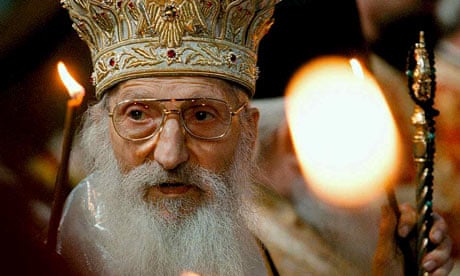His Holiness Pavle, Archbishop of Pec, Metropolitan of Belgrade and Karlovci, and Patriarch of the Serbian Orthodox church – it is a grand title, and in some ways seems at odds with the life of the man who bore it for almost 19 years. As far as possible, Patriarch Pavle, who has died aged 95, lived a life of humble simplicity. In the quiet and gentle way he dealt with everyone he met, it was possible to see the very deep spirituality and personal holiness and wisdom that so many people recognised in him – holiness and wisdom which, perhaps, account for the great respect and affection that so many people in Serbia, whether religious or not, had for him.
A lively example of this – and of his quick and sometimes mischievous wit – can be seen in the frequently told anecdote of his response to the arrival of other bishops of the Serbian Orthodox Church for a meeting of the Holy Synod. Looking out of the window of his rather spartan rooms in the patriarchate at the assembled Mercedes and BMWs in which his colleagues were arriving, he wondered out loud what the bishops would be travelling in had they not taken vows of poverty. He usually travelled by public transport, and was a familiar sight on the buses and trams of Belgrade.
Pavle's tenure in the office of patriarch spanned a difficult period in the life of both his church and his country. Taking office in December 1990, he was called on to guide the church through the years of Yugoslavia's protracted and violent demise, the sanctions imposed on Serbia as a result, and, finally, the crisis over Kosovo and the Nato bombing campaign of 1999, which was the result of events there. During this period, there were moments when his actions may have seemed contradictory: making joint statements with the leaders of the Muslim and Catholic communities on Bosnia condemning inter-ethnic hatred and violence, while remaining close to the Bosnian Serb leadership; wavering between supporting and condemning president Slobodan Milosevic during the 1990s.
He was perhaps politically naive, especially when facing the situation of a resurgent national church emerging from long decades of communist repression, and a resurgent nationalist political movement seeking to settle old scores and create a "greater Serbia", a movement that sought to co-opt the church into validating its aims. However, his main concern was always for the people and the church he loved, and he had the grace to apologise publicly when he realised that he had taken false steps in the political arena.
Born in the early months of the first world war, Pavle was educated in his local village school in Slavonia (now in Croatia), and later in Tuzla (now in Bosnia-Herzegovina) and Belgrade, before entering the Orthodox seminary in Sarajevo in 1930 – in spite of showing a far greater aptitude for technical subjects than for theology. In 1936 he moved to the medical faculty of Belgrade University, transferring later to the theological faculty, and enlisting in the army medical corps when the second world war broke out.
During the Nazi and Bulgarian occupation, he worked first in Belgrade, clearing debris from the bombing, and later in various monasteries as a teacher of refugee children. In this period, he was also diagnosed with tuberculosis, but after the war his health improved greatly.
He entered monastic orders and took the name Pavle in 1948 – he had been born Gojko Stojcevic – spending time in the monasteries of Blagovestenje and Raca, and teaching in the seminary in Prizren in Kosovo. He continued his academic studies, and in 1957 he was awarded a doctorate in New Testament and liturgy by the Theological Academy in Athens, and consecrated as bishop of Raska and Prizren, a diocese covering southern Serbia and Kosovo, with large Muslim and Albanian minorities. More than 30 years later, in December 1990, he was elected patriarch, taking the place of Patriarch German, who was ill and would die the following year.
Pavle's attachment to Kosovo remained strong throughout his life and ministry, and it caused great pain and sadness for him to see the region torn apart by inter-ethnic violence in the late 1990s. He worked tirelessly to bring the plight of the Orthodox population there – and the region's many cultural treasures in its ancient monasteries and monuments – to the attention of the world, but sadly his quiet voice often went unheard.
The final years of his life were marked by increasing frailty and ill health, and from the autumn of 2007, he was a permanent resident in the military medical academy in Belgrade, although he continued for some time to issue public statements and comments.
